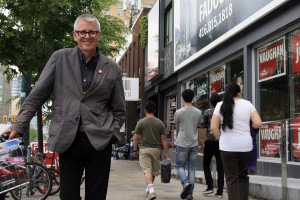
Adam Vaughn, who is running in the Trinity-Spadina by-election on June 30, poses in front of his campaign office on Spadina Avenue, in the midst of what Jane Jacobs, who had a profound influence on Vaughan, would term the “ballet of the sidewalk.”
Vaughan driven by urgent need to bring practical experience to federal politics
By Annemarie Brissenden
Adam Vaughan spoke his first words in French at 45 Walmer Rd. in the Annex, where he was a young student at the Institute of Child Study.
“One day I ran away and hid in Sibelius Park, and it was decided I needed more structure, so I went to Hillcrest after that,” recalled Vaughan, during an exclusive interview with the Gleaner.
In the wide-ranging conversation, the Liberal candidate, who is running to become Trinity-Spadina’s member of parliament, stressed his long history in the riding, and the drive that’s fuelled by his commitment to an urban agenda. He also talked about some of the people, two women in particular, who have guided him over the years.
“Everyone talks about my Dad in politics,” said Vaughan. “But my mother was a very big influence in my life. And my mother said if you go into politics, it ought to be for a reason.”
For Vaughan, it’s delivering on a workable urban agenda “that delivers results quickly, because the city needs help now.” And his understanding of what cities need to thrive comes from Jane Jacobs.
“She’s been a profound influence all my life on a whole range of thinking,” explained Vaughan, who invoked Jacobs repeatedly throughout the interview. He was attracted to the Liberal Party, in part, because it “is now starting to think and act in some of the ways that Jane Jacobs talked about.”
Ultimately, however, Vaughan’s decision to run was based on his recognition that the city doesn’t just need a strong partner in Ottawa, it needs a strong partner that understands the nuances of how municipalities function.
“The number of times you end up making speeches from the floor of council, or in front of community meetings about if we only had Ottawa,” said Vaughan. But, you also “have to know how cities require that help to be delivered.”
“There’s lots of theory and lots of good intention [in Ottawa and Queen’s Park],” he explained, “but there isn’t practical experience.”
Vaughan is troubled, for example, by the positions some with less experience have taken on the proposed island airport expansion, which he views as about more than just jets. He wants to reform the Port Authority and make it a public agency that, like Waterfront Toronto, is accountable to the community. He also wants to have federal status granted to a bird sanctuary located at the end of the runway that’s a critical stop for migratory songbirds, because, he said, these are “things that can be done [federally] to protect the balance of the waterfront.”
According to Vaughan, the Toronto District School Board’s attempt to bring a championship field to Central Technical School is another instance of a lack of understanding and respect for the city’s processes.
“[The school board] signed a memorandum of understanding before they even came to talk to the neighbourhood,” explained Vaughan. “You don’t build things quickly in Toronto. It’s a tough and very complex building environment. But when you choose not to collaborate with people, you create problems.”
It’s that sense of collaboration that he hopes to bring to Ottawa, as he pushes forward on his urban agenda, focused in large part on Toronto’s housing crisis.
“Toronto is home to the largest collection of children living in poverty in the country. If you don’t have a housing agenda, you are not housing kids properly, and if you don’t house kids properly, that extrapolates out into a really, really volatile social situation.”
Vaughan stresses, though, that the urban agenda is about more than “hard infrastructure. It’s also the stuff that cities create, as Jane Jacobs said, by simply coming into existence.”
At the heart of “that stuff” is culture, the “heart and soul of what we do in Trinity-Spadina.” It is also a critical driver of the riding’s local economy.
“Culture is a great thing from a nationalist pride perspective,” he added, “but as a fundamental building block to this neighbourhood, it has got to be spoken to as part of an integrated urban agenda, because it is that fundamental to how you build a city.”
Despite so many important files on his desk, Vaughan is confident that the constituency office is in good hands following his resignation. All but one of his staff remains in place at City Hall, and an interim councillor will be appointed shortly to represent the ward at the last two city council meetings before the municipal election in October.
He’s chosen not to pick a successor, as “the ward seat belongs to the neighbourhoods,” and will deliver “a full and comprehensive briefing, and leave behind every single file for the next councillor, regardless of who they are.”
And if he doesn’t win the seat?
“Then I am out of politics. I will have to find a job.”
But he is “intent on getting to Ottawa, and intent on building a national housing strategy.
“I have been working towards that for 25 years.”
